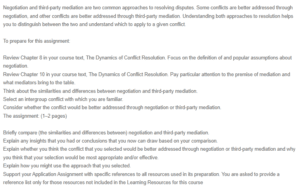Negotiation and Third-Party Mediation
Negotiation and mediation conflict resolution methods involve the intervention of a neutral third party. One of the differences between the two conflict resolution methods is the role of the mediator. In mediation, a third party plays an active role in guiding and proposing a mutually acceptable solution to both parties (Mayer, 2012). However, in negotiation, the role of a third party is limited to facilitating communication as the conflicting parties identify a common ground. Another difference concerns the influence of the third party in decision-making. For third-party mediation, the mediator influences the position reached by the negotiating parties. Even from the onset, disputants want mediators to figure out the best solution for the conflict (Mayer, 2012). However, in negotiation, third parties cannot impose a solution to the conflict.
Despite the few differences, negotiation, and third-party mediation share some similarities. One such similarity is the involvement of a third party to establish trust and create a sense of fairness (Mayer, 2012). Also, the decision to participate in either of the two conflict resolution methods is voluntary. Disputants willingly initiate the process and may withdraw at will. Another similarity is the flexibility of the two negotiation processes, making them adaptable to different situations.
Based on the above differences and similarities, third-party mediation is best suited for conflicts where competition and rivalry are high. Since the third party in mediation has some decision-making authority, they will impose a solution and guide disputants toward a common ground. On the other hand, negotiation is good, where the level of rivalry is less. Negotiation suits a dispute where the disputants are on talking terms.
Negotiation is the best method to resolve the conflict between the employee and employer regarding promotion concerns. The employer and employer have worked together before, and hence, they are familiar with each other. Besides, negotiation facilitates a one-on-one interaction between the disputants, which makes it possible for the parties to explore creative problem-solving (Fisher & Shapiro, 2005). Based on the aggrieved employee’s behavior, it is obvious that they struggle to express their needs; hence, a third party will help facilitate communication.
To resolve the conflict, the employer and employee should look for a third party to facilitate the negotiation process. The third-party should preferably be the human resource manager or another senior company employee. A third party will initiate the conversation between the aggrieved employee and their employer. Subsequently, the third party will create an atmosphere that allows everyone to express themselves freely. Once the parties are in a position to communicate with each other freely, the employees should present compelling reasons why they think that they deserve a promotion. Finally, the two parties will negotiate the terms of the agreement and reach a middle ground.
References
Fisher, R., & Shapiro, D. (2005). Beyond reason: Using emotions as you negotiate. Penguin.
Mayer, B. S. (2012). The dynamics of conflict: A guide to engagement and intervention. John Wiley & Sons.
ORDER A PLAGIARISM-FREE PAPER HERE
We’ll write everything from scratch
Question
Negotiation and third-party mediation are two common approaches to resolving disputes. Some conflicts are better addressed through negotiation, and other conflicts are better addressed through third-party mediation. Understanding both approaches to resolution helps you to distinguish between the two and understand which to apply to a given conflict.

Negotiation and Third-Party Mediation
To prepare for this assignment:
Review Chapter 8 in your course text, The Dynamics of Conflict Resolution. Focus on the definition of and popular assumptions about negotiation.
Review Chapter 10 in your course text, The Dynamics of Conflict Resolution. Pay particular attention to the premise of mediation and what mediators bring to the table.
Think about the similarities and differences between negotiation and third-party mediation.
Select an intergroup conflict with which you are familiar.
Consider whether the conflict would be better addressed through negotiation or third-party mediation.
The assignment: (1–2 pages)
Briefly compare (the similarities and differences between) negotiation and third-party mediation.
Explain any insights that you had or conclusions that you now can draw based on your comparison.
Explain whether you think the conflict that you selected would be better addressed through negotiation or third-party mediation and why you think that your selection would be most appropriate and/or effective.
Explain how you might use the approach that you selected.
Support your Application Assignment with specific references to all resources used in its preparation. You are asked to provide a reference list only for those resources not included in the Learning Resources for this course

